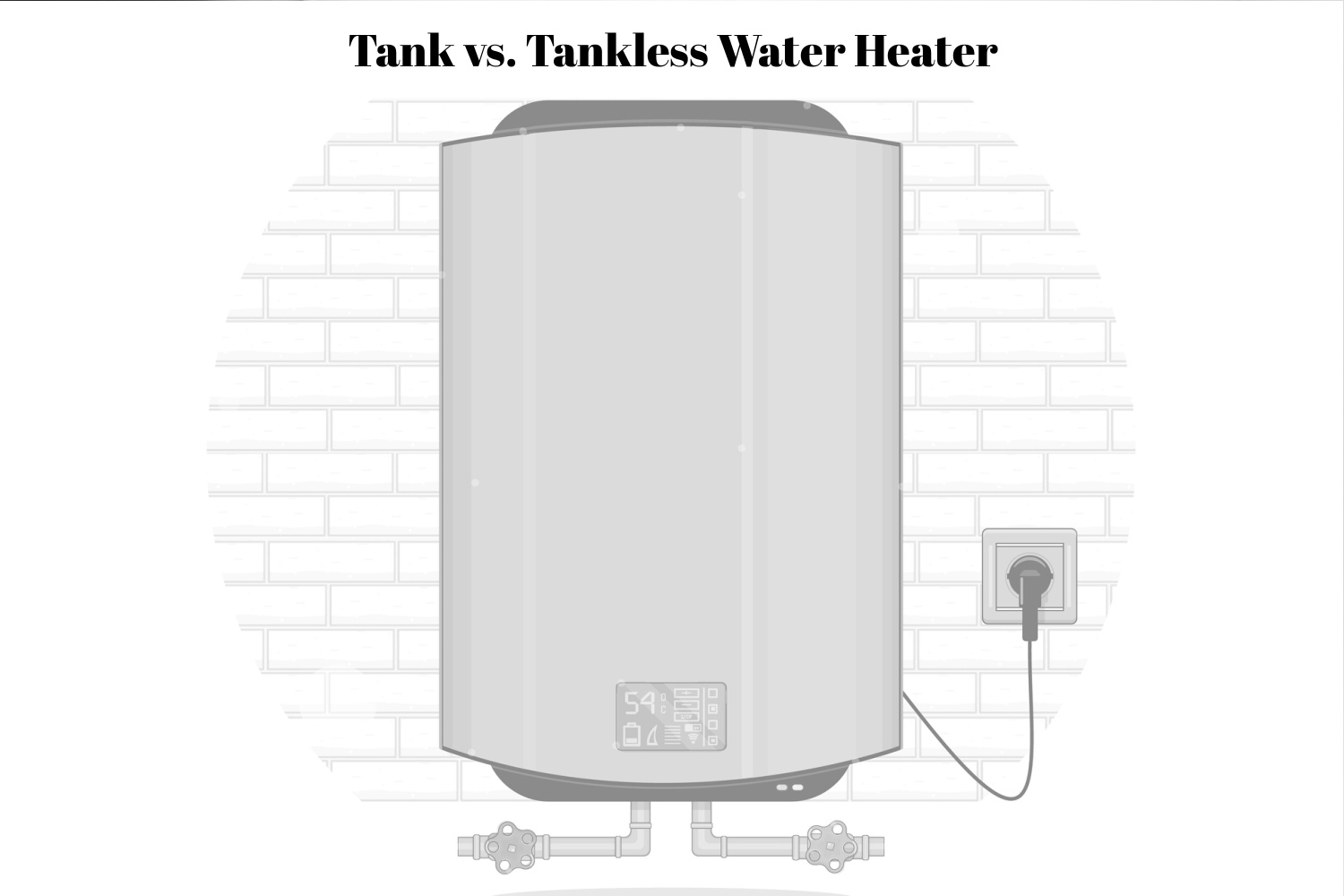Both tank and tankless water heaters offer unique ways to heat your water, but how do they differ, and which is better for your needs? This guide will help you understand these appliances, laying out the pros and cons of each to make your decision easier.

Tank water heaters store and heat water to a preset temperature before distributing it throughout your home. The tank constantly refills and reheats, ensuring a steady hot water supply. With varying capacities from 30 to 80 gallons, tank water heaters can be tailored to your family’s requirements. However, they do consume more energy to maintain hot water.
You’ll find electric, gas, propane, and even solar-powered options on the market.
Tankless water(instantaneous) heaters heat water instantly as it flows through the unit, offering energy-efficient operation. They are rated by gallons per minute, so if you have multiple fixtures running at the same time, you might get less-than-hot water.
These units are pricier upfront but save money in the long run due to their efficiency.
Here are the main points to consider when choosing between tank and tankless water heaters.
Pros:
Various capacities for different family sizes.Lower initial cost, with models ranging from $773 to $2,096.Suitable for colder climates.Multiple energy source options.Easier and cheaper to maintain.
Cons:
Less energy-efficient.Can occupy significant space.Shorter lifespan, around 12-15 years.Risk of bacterial growth if not well-maintained.
Pros:
Compact size, offering flexible installation options.Longer lifespan, exceeding 20 years with proper maintenance.Higher energy efficiency leads to long-term savings.
Cons:
Costly initial investment, ranging from $1,133 to $3,500.More complex installation and maintenance.Water flow limitations.
While the initial investment for a tankless water heater may be higher, it’s essential to consider the long-term costs. Tankless systems often result in lower energy bills due to their efficiency, saving an average of $100 per year. They also last longer, meaning you’ll save on replacement costs in the long run.
Tank water heaters, on the other hand, consume more energy to keep water hot, leading to higher utility bills. They also have a shorter lifespan, usually requiring replacement every 12 to 15 years, compared to the 20+ years a well-maintained tankless system can last.
If you add up the cost of potentially more frequent replacements and higher energy bills, a tank water heater could end up costing you more in the long run.
The ease or difficulty of installation can also tip the scales when deciding between a tank and a tankless water heater. Tank models are generally more straightforward and quicker to install, usually requiring just a few hours. They’re also more forgiving regarding placement, given the ubiquitous nature of their design.
Tankless models demand a more complex installation process, often requiring electrical or gas line modifications and even venting alterations. An experienced technician is usually required for this job, adding to the installation costs. Additionally, the installation could take a full day, depending on your home’s existing infrastructure.
Tankless water heaters generally require annual maintenance to ensure they run efficiently. This often involves flushing the system to remove scale and sediment, checking for leaks, and inspecting the venting system. For gas units, the burner assembly and fan may also need cleaning. Annual maintenance can cost anywhere from $100 to $200 if done by a professional.
Furthermore, given the complexity of tankless water heaters, especially gas models, it’s recommended to have a qualified technician handle any repairs or maintenance. Labor costs can range from $50 to $150 per hour, depending on your location and the technician’s expertise.
When you add up annual maintenance, occasional part replacements, and labor, you can expect to spend a few hundred dollars per year on maintaining your tankless water heater.
When replacing an existing unit, sticking with the same type and energy source often makes sense. This approach simplifies installation and maintenance. However, switching to a tankless system could be beneficial if you aim to increase your home’s energy efficiency.
Criteria for Your Choice:
Capacity: Choose one that meets your peak demand for tank water heaters. A 46-56 gallon tank usually suffices for a family of three to five.Flow Rate: For tankless systems, aim for a unit that can handle up to 7 gallons per minute to accommodate larger families.Efficiency: Prioritize energy-efficient models to save on utility bills.Warranty and Lifespan: Look for a unit with an extended warranty and a lifespan that justifies the cost.

Gisele Bundchen's contemporary twist on this emerging design trend is the talking point of her kitchen
Zendaya taps into the subtle power of this accessory to ensure her neutral living room is never boring
Amazon has become a go-to for chic home decor – here’s what we’re shopping from the 2024 Spring Sale
This designer's 'every seat needs a surface' rule has changed my living room layout forever – here's what I mean
5 designer Amazon storefronts that make shopping for stylish homeware so much easier
Joanna Gaines' 'mesmerizing' garden is the perfect example of how to grow cut spring flowers at home
Tan France opts for this stabilizing color palette to 'ground' his guest cottage, experts say
Shark's St Patrick's Day sale is here - and you can save $100s on vacuums and air purifiers
Matthew and Camila McConaughey's raw cabinets possess a texture and warmth that's replicable in our kitchens
Coffee Grounds for De-Icing: Does It Work?
How Long Can You Expect Your Water Heater to Last?
10 Expert Fixes to Flush Your Clogging Woes Away
How Much Does it Cost to Replace a Water Heater?
Water Heater Maintenance Checklist
Winter Home Maintenance Checklist For Before the Cold Weather Arrives
Don’t Make These Rain Barrel Blunders! Top 6 Mistakes to Dodge
Tank vs. Tankless Water Heater: Which is Right for You?
Ideas for Decorating a Windowless Room
16 Kid’s Room Paint Ideas to Inspire Creativity and Joy